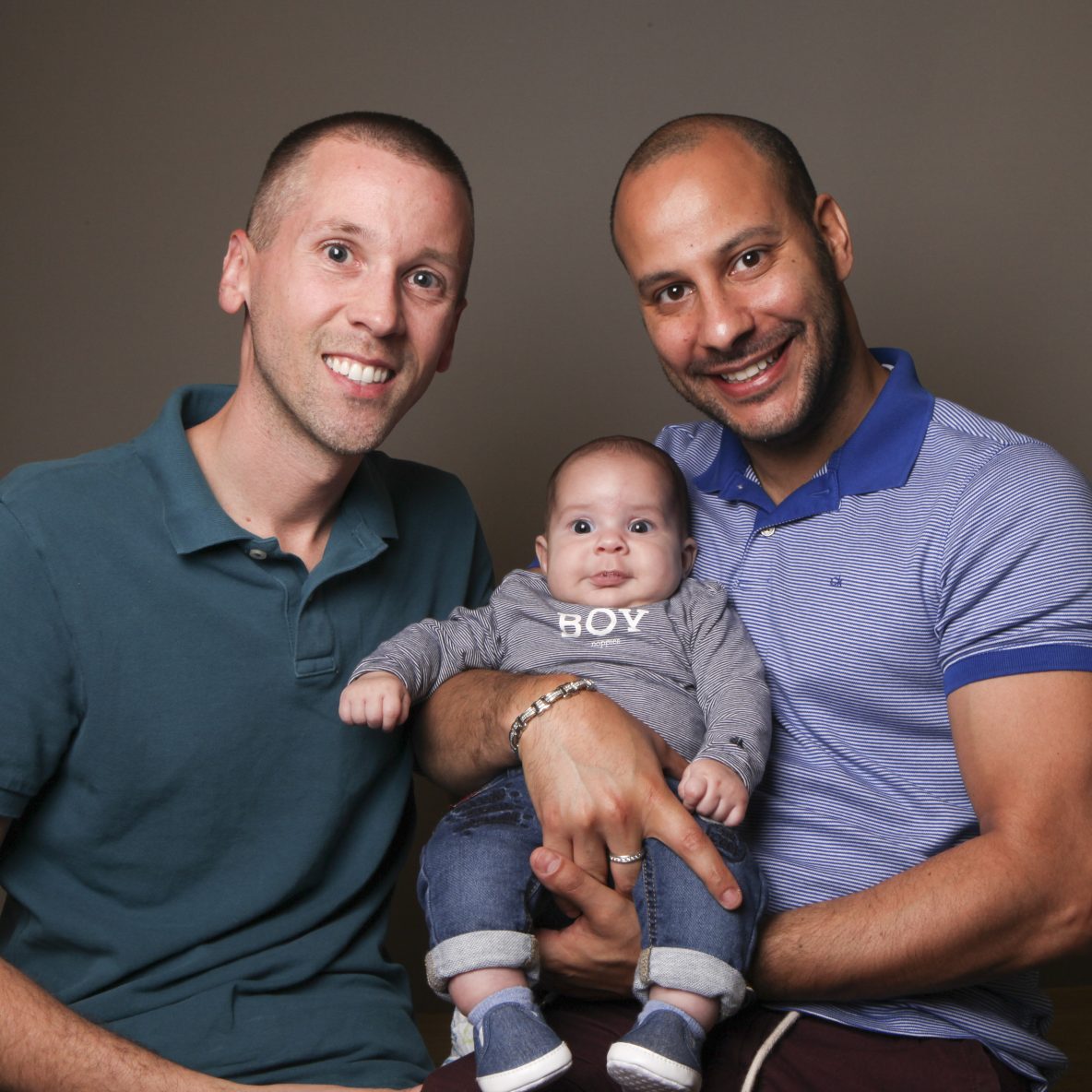Steven and Oren currently live in Belgium, and Oren is originally from Israel. They came to surrogacy through their involvement with Men Having Babies and their Gay Parents Assistance Program. Canadian Fertility Consulting offered to help Steven and Oren make their dreams of becoming parents come true by offering pro-bono consulting services. They recently welcomed home their little boy Jayden this March. This is their story:
Why did you decide to pursue surrogacy to build your family?
S: We really wanted to have our genetic or biological child. We could have gone through with the adoption, but our first choice was to have our own blood-related child. That was one aspect, the other was that adoption is becoming more and more difficult for gay couples. Countries that were open to gay couples adopting in the past have recently changed their laws that prohibit gay couples from adopting. There is also quite a long waiting list to adopt children, and it can take many years for it to be approved.
O: Basically, we didn’t want to wait that long. While surrogacy is still a lengthy process, we knew it would take less time than adoption.
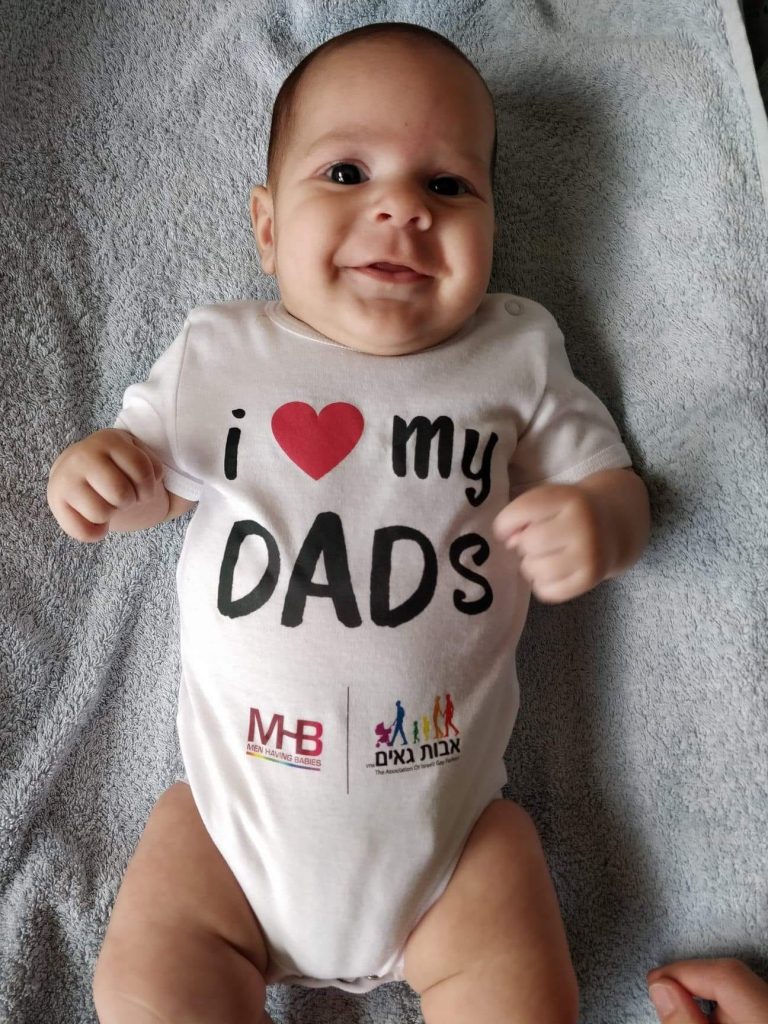
Who supported you most in your decision to use a surrogate?
O: We had Men Having Babies assisting us, and without them, this entire process would have never had happened. I think what helped us most was going to conventions and also volunteering, which made it a lot easier because we got so much information. With Men Having Babies, we had a Case Manager who guided us along the way. Since we are GPAP (Gay Parenting Assistance Program), it was a very direct process.
S: GPAP is a program developed by Men Having Babies to help gay couples to achieve their lifetime dream of having a family. The way it worked for us was that we applied, and our application has to be processed to receive one of two different levels of assistance. In Stage One, it’s a much easier process to apply for and be approved, and once you are approved you receive discounted service fees from the consulting agencies. The next level is Stage Two where Intended Parents receive services that are pro-bono, and the agency service fees are waived. The whole process takes about six to nine months to be approved for Stage Two, and there are only a handful of couples who qualify for this level of funding. In 2016, we were a part of the lucky few who were accepted into the program, and the first and only Belgian couple who have ever been accepted by GPAP Stage Two.
O: Our Case Manager at Canadian Fertility Consulting was also very helpful, and our relatives as well. We had a lot of support along the journey, and I can’t think of anyone who ever said anything negative about our choice. We’ve been very blessed.
What was your egg donation experience like?
O: We were matched with a donor that we selected through Egg Helpers. Overall, our experience with Egg Helpers was extremely smooth, even though we had a few issues with the first egg donor we had selected. She was from British Columbia, and we paid for her flight all the way to Toronto for her to attend her medical screening. After she went returned to BC, we were about to sign the contract, but she backed out at the last minute.
S: Although she backed out, we were very understanding because we know it’s an intimate and delicate procedure. We were definitely disappointed, as it was a setback along our journey’s timeline, but we never placed any blame on her for her decision as we understood where she was coming from.
O: After she decided not to go through with the procedure, we had to be re-matched with a new donor. She was amazing. At first, she wanted to remain anonymous, but we reached out and asked if she would mind being a known donor. She agreed, and when we had our first Skype conversation we clicked right away. We still stay in touch, we exchange lots of pictures, she always comments on all of our photos, and she’s just really amazing. She’s even willing to do another round with us for a sibling journey if we decide to go through with another surrogacy, even though originally, she only wanted to complete the single donation. When we did the retrieval, we used only my sperm to fertilize all of the eggs. Our advice for other couples who may be planning on using the same egg donor for a later sibling journey is to have both Intended Father’s fertilize the eggs at the same time.
S: The reason why we didn’t do this at the time was that we have different skin tones and different ethnic backgrounds. Oren is from the Middle East with a little bit darker skin, so our initial thought was to try and have children with skin tones that were in between us. So, for Oren, because he has darker skin, we looked for a Caucasian woman, and for the sibling journey, initially, we were thinking of picking an egg donor who had a similar skin tone as Oren. That’s why we originally fertilized all of the eggs with Oren’s sperm. After we had gone through the entire process, and after developing this good connection with the egg donor, we wished we hadn’t done that and instead split the eggs and fertilized half with Oren’s sperm, and the other half with my own. It was a decision we made back then that we couldn’t have had the foresight to predict.
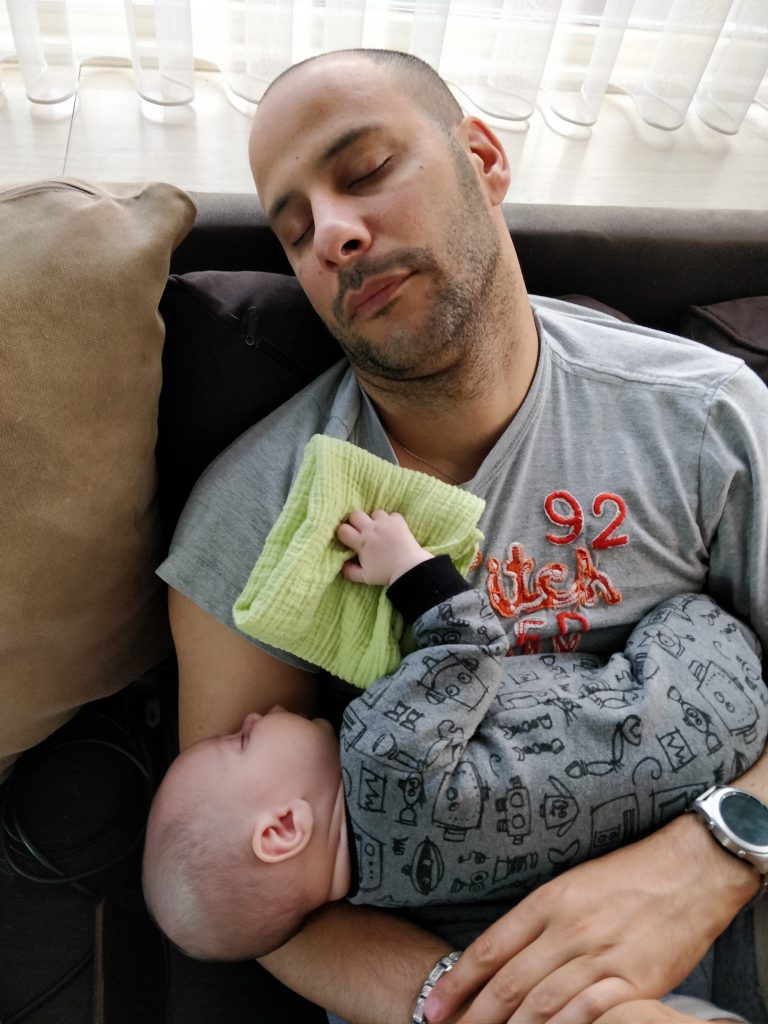
What qualities did you look for in a donor?
O: After our first donor decided not to go forward with the procedure, we wanted our second donor to be closer to our clinic in Toronto in order to cut down the travel costs. It was very important for us to have a donor close to our clinic.
S: Other than the donor’s location, and while it may sound superficial, obviously we were selecting our donor based on her looks to a certain extent.
O: And other than her looks, we were very focused on our donor having good medical results without any genetic diseases throughout her family tree. We found it really comforting while we were selecting our donor to go over her family’s history, investigate the wellbeing of her family, and chose her based on the medical data that we were presented.
S: We really wanted a known donor. I’m very future-oriented and I’m always thinking about the worst-case scenario. I was concerned about the possibility of our child developing a genetic disease – what if he needs the help of our egg donor one day? Or, what if she has children one day and they develop some sort of medical issue? In these cases, we would like to be able to find out about any important details down the road. So, having a known donor was also a really important factor in our choice in an egg donor.
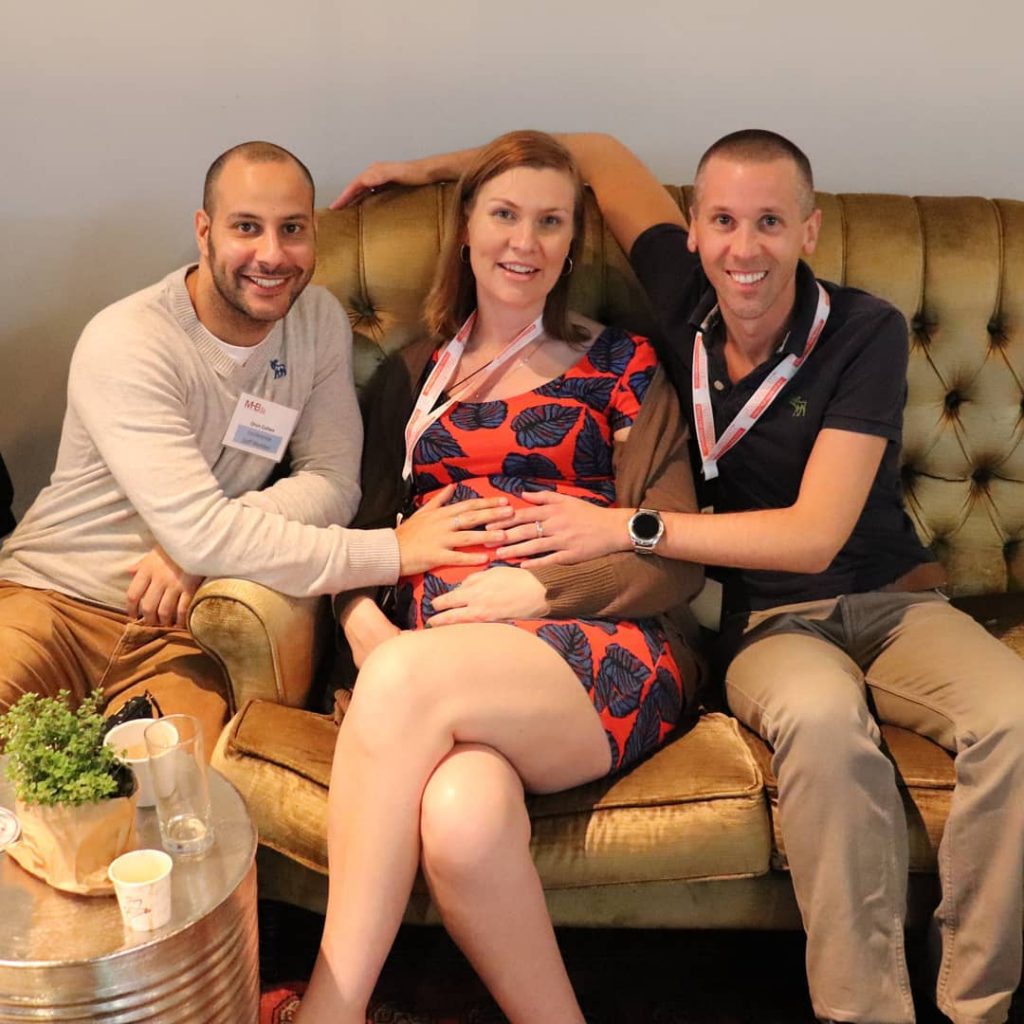
How did you select your surrogate?
O: Similar to our egg donor experience, we also had two surrogates where the first one wasn’t able to move forward due to some personal and health-related reasons. We asked Canadian Fertility Consulting to rematch us, and Leia reached out to us to suggest we make a video to introduce ourselves to the surrogates and really explain who we are, as a video can say so much more than just pictures. We recorded our video in a single take, and we decided that whatever happened would be on our video.
S: We didn’t prepare anything, we didn’t have a script, we just wanted our video to come straight from our heart.
O: We were rematched less than a month after our first match didn’t work out. Our surrogate received three profiles in one day, and when she saw ours, she knew right away that we were the couple that she wanted to work with. When we were first introduced over video conference, it was a bit strange because we were sitting across from her and her husband and we weren’t sure what to say, but once we all started talking, we knew right away that it would be a good fit.
S: Before going into the meeting, I think we were both a bit nervous as we’re all complete strangers – what sort of things should we say? We wanted to give off a good impression because there is so much on the line, but we also wanted to remain genuine.
O: Instead of it being a half an hour introduction, it ended up being a three-hour conversation. Our second video call was supposed to be with someone from CFC to make sure that we were all getting along, and after about five minutes of conversation, she actually left because she realised she wasn’t needed to mediate as we are all getting along so well. Even to this day, we consider our surrogate and her family like they’re our extended family. We love our surrogate, her husband, and her kids.
S: In terms of our criteria for selecting a surrogate, we were not that strict. The first important component was the financial aspect with regard to lost wages. As we were accessing surrogacy through GPAP we had a limited budget, so we would have never been able to afford a surrogate who, for example, was a lawyer and making an amount per month that is totally out of our price range. Another important factor was her lifestyle and making sure she was eating healthy and would be able to maintain that healthy lifestyle throughout the course of the pregnancy.
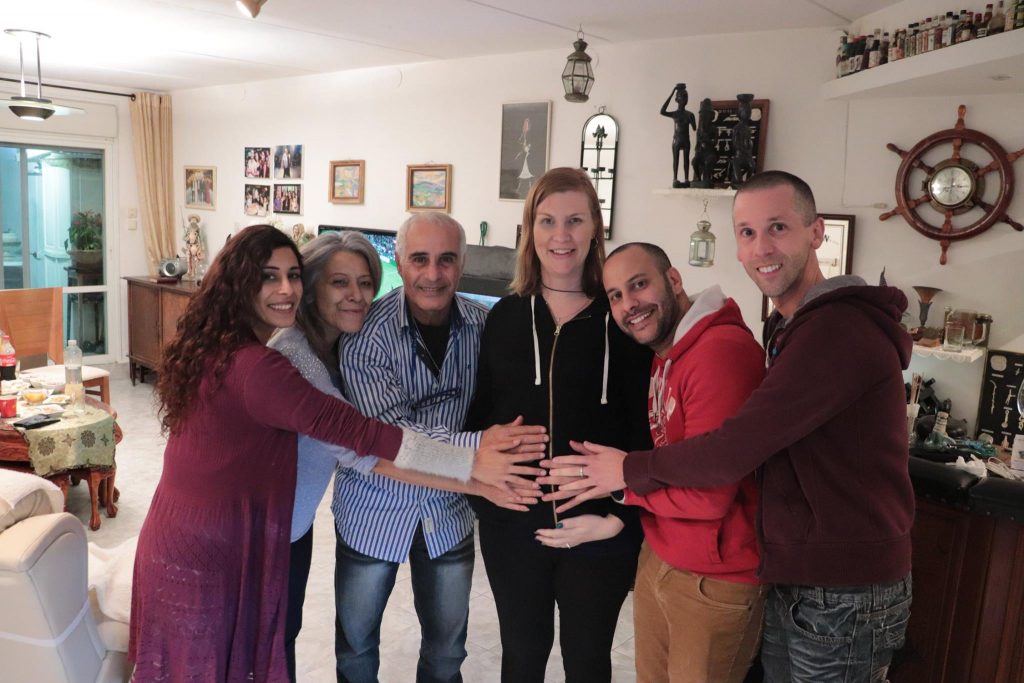
What was your relationship with her like?
O: Beyond our weekly scheduled Skype conversation, we also had an online calendar where all of her events related to the pregnancy were shared with us and we could follow along on her journey. We really tried to have an open relationship with her where we could all talk about anything and everything, from the what’s happening with the pregnancy to what’s happening within our personal lives. We had no taboos.
S: We still have a great relationship with her, but we obviously talk less often as our little guy is taking up a lot of our time. They also have four kids of their own, so we’re all very busy juggling our family lives. However, we still have weekly Skype calls and send each other daily messages.
O: During our journey, Leia actually managed to have our surrogate to fly to Israel with her husband, where everyone in my family is located. I was there to help with a surrogacy convention, and our surrogate was there on behalf of Canadian Fertility Consulting and our fertility clinic, CReATe Fertility Centre. After the convention, she was able to meet my mom and dad which was really amazing. I don’t think it’s very often that International couples are able to have their entire extended family meet the surrogate, so we consider ourselves very lucky.
S: We also went to visit her in Vancouver for her eighteen-week ultrasound, so we were able to reveal the gender with her. We were together with her and her husband for the 3D ultrasound, and we were all very excited and happy. We were each leaning towards different genders but based on our surrogate’s four previous pregnancies and her symptoms, she believed it was a girl and was pretty surprised when we were all told it was a boy. Afterwards, we flew back home, and we had the gender reveal party here in Belgium. We first told Oren’s family, and we had an event going over Skype where we all had different cupcakes of different colours to guess if it was a boy or a girl. We did a similar thing here for my family and our friends with balloons, where we had people choose a colour. It was all very fun and exciting.
O: Our surrogate also suffered a stroke when she was four-years-old and still struggles with some paralysis to this day where one of her arms is not functional. She was able, with only one functioning arm, to knit us and the baby a huge blanket over the course of three months. When I saw her beautiful blanket and her devotion to us, I just started to cry because I couldn’t believe how someone with one hand could have so much power. Our bond with her is so much more than just having the baby, and we thank CFC for matching us with this truly incredible person.
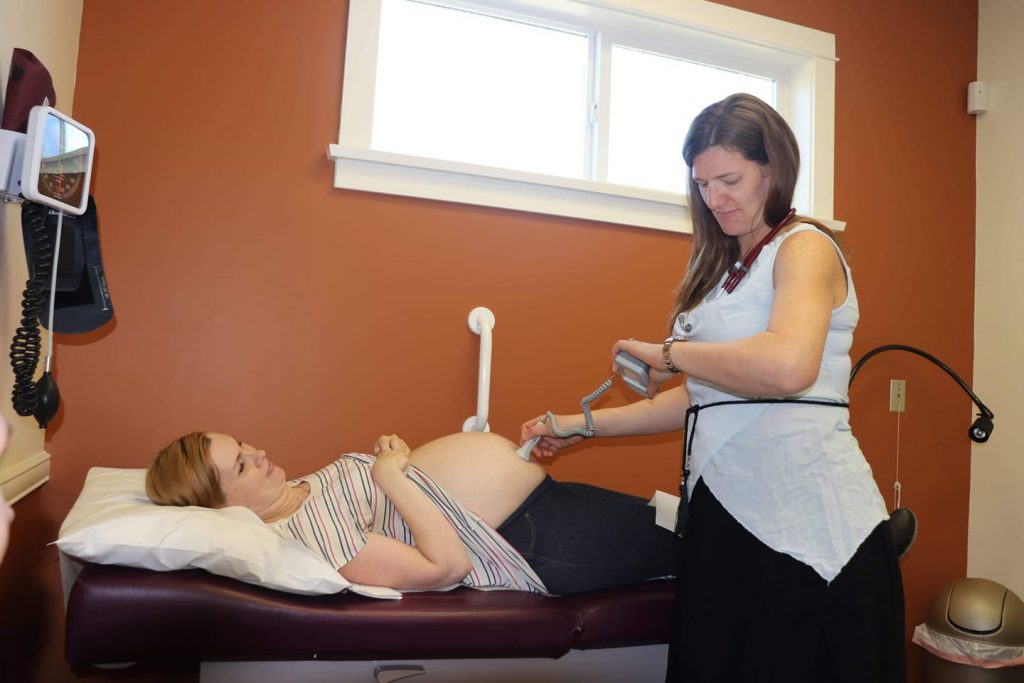
What was your role in her pregnancy?
O: We were with her every step of the way via Skype. When she went for the embryo transfer, we were Skyping with her. The first time didn’t work, so we Skyped with her the second time as well. She even brought a teddy bear with her who had both of our initials embroidered on to it and called it her lucky charm when she went in for transfers.
S: After the transfer, we flew to Vancouver to meet with them during her 18th weeks of pregnancy for the gender reveal. The final appointment where we were there with her was a week before her delivery. For all of her other check-ups, we weren’t present via Skype because we trusted her, and we didn’t want to be too intrusive during those procedures. She was always more than willing to Skype with us, and we would have also been happy to be present, but often the doctors wouldn’t allow it to be recorded. She had already had four children of her own, and three caesarian sections, so we trusted in her experience, and she always asked us if we had any questions we would like to bring up with the doctor during her appointments. After every visit, she would send us updates, so we were always well informed. At one point she thought she had a miscarriage during the early stages of the pregnancy, and her husband called us in a panic to explain the situation. She decided to travel from her home in Langley, to the women’s hospital in Vancouver so she would get specialized treatment. In the end, everything was fine, but this is just an example of how we were always kept well informed.
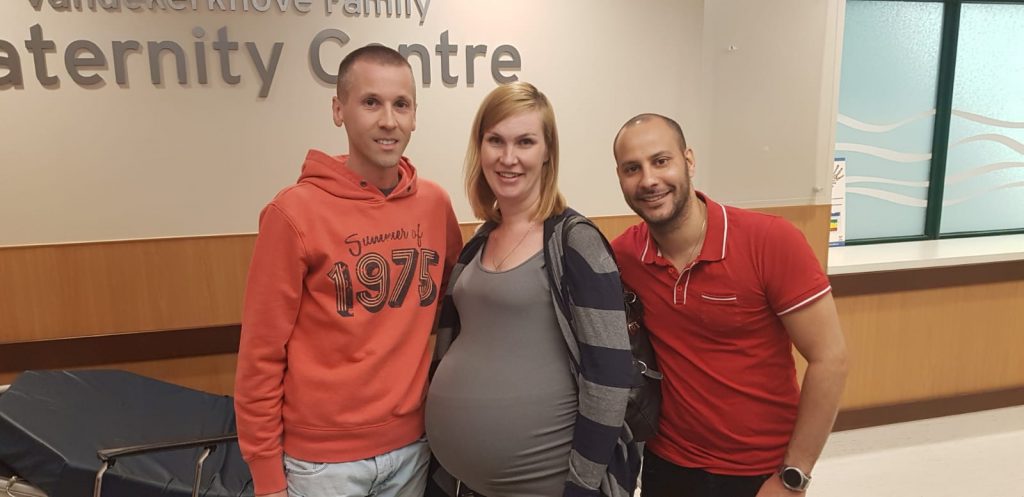
Did you face any challenges as an International Couple?
O: Distance-wise, it was a bit of a struggle for us because we would have loved to be there for each stage and development of the pregnancy. If surrogacy closer to home were an option, I’m sure we would have been a lot more involved in terms of seeing the surrogate on a regular basis and doing our best to care for her.
S: Of course, we did see the photos of her belly getting bigger, and the videos of the baby moving around, but there’s a big difference between seeing a picture and seeing it in real life. When we saw Shanna in December, her belly was already pretty big, and it was amazing to put on hands on it and feeling the baby kicking. It was truly magical. We missed seeing it on a day-to-day basis. Another difference with being an International couple is the wait times, as it’s a bit longer than couples who are native to Canada.
O: However, compared to other International couples, we really didn’t wait that long and it was fairly reasonable.
S: Even though our surrogacy process went fairly quickly, it still felt very slow because of the distance and not having that feeling of control over the situation. We also had to work with our local legislation to make sure we could come back home legally with our child, and what names we could put on the birth certificate. These are extra costs and procedures that all International couples must face, so it didn’t come to us as a surprise or a setback.
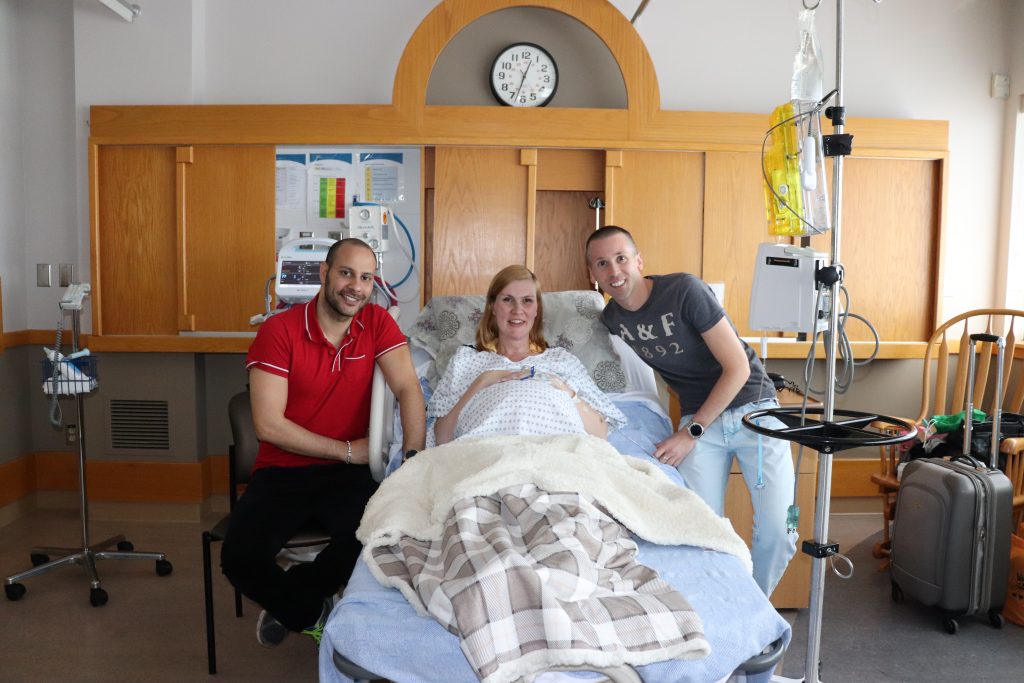
What was the birth like?
S: It was nerve-wracking because it was a planned c-section and we didn’t know if either one of us would be allowed into the operating room. She delivered at a fairly small hospital that had only one operation room so she kept getting bumped until a later time due to other emergencies that would come in.
O: Originally, she was scheduled to have her C-section on the 20th, but that was Steve’s mother’s birthday so we asked if she could have it the next day, as it was our 10-year anniversary. They said that it had to be done on the 20th, but because our surrogate’s surgery time kept getting moved forward, she ended up giving birth on the 21st anyway and we got to celebrate our anniversary with the birth of our first child.
S: Going into the caesarian section, it was exciting, stressful, nerve-wracking, so many different emotions at the same time! Not only were we bumped until the next day, but until 11 pm, so we were sitting with her and husband all day waiting until the moment when it was finally her turn. At around 8 pm, they had come up to her room to get her prepared, and we went down to the operating room and they were just about to give her the epidural when everything stopped because there had been another emergency. We all had to go back up and wait some more, but we were all at the peak of an adrenaline rush! It was such a rollercoaster of emotions.
O: When it was finally our turn, we weren’t allowed in the operating room, but from behind the doors we could hear his screams.
S: We were both behind a different glass window trying to look in, but we couldn’t see anything. All we could see was a cleaning lady who was walking between the aisle and she looked at us and gave us a big thumbs up.
O: Moments after he was born, he was already in our arms and we stayed up all night just holding him in amazement.
S: It was just amazing. Seeing him for the first time was a truly indescribable experience.
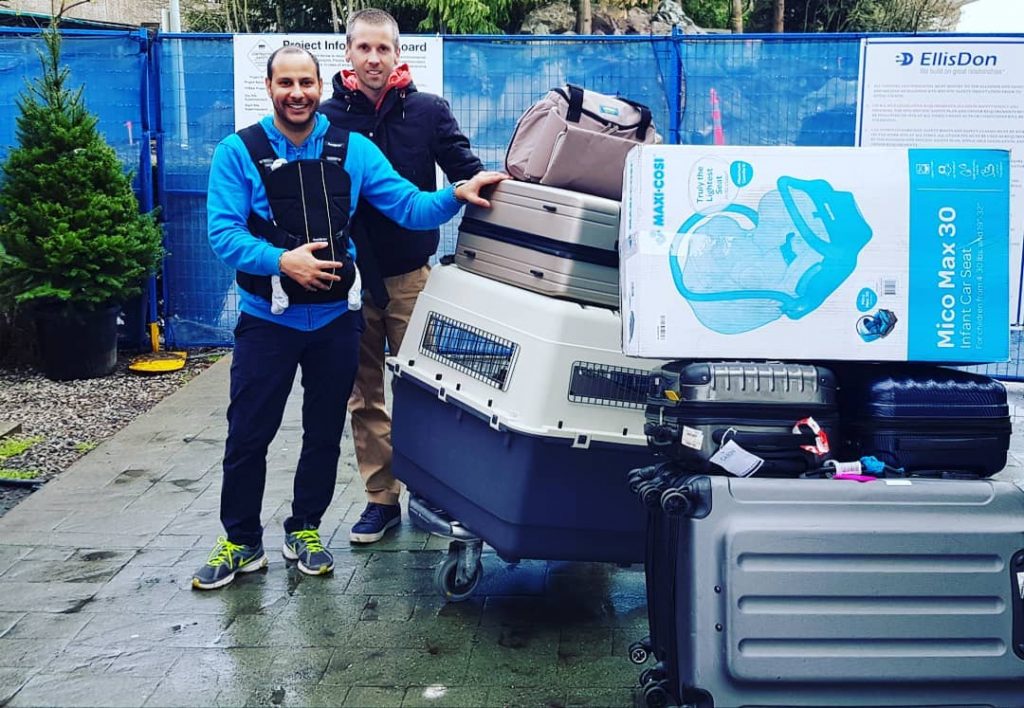
What was it like taking the baby home, and how is home life?
S: Getting home was a bit stressful. We had issues with getting Jayden’s passport and we didn’t get it until the day right before we left. We also had some issues with the airline because we brought our Labrador Retriever with us to Canada. Our dog is a very important part of our life, and we wanted him to be involved in the surrogacy from the beginning. He stayed in the Air BnB while Jayden was being born, but just afterwards Oren went over and brought Jayden’s beanie so that our dog could smell it and be introduced to our baby right from the very beginning. So, while it was stressful travelling back home, once we arrived it was a huge relief and such a comfort.
O: As soon as we got back to Belgium, we had so much support from Steven’s family and our friends. Less than ten days after returning, we were already flying to Israel to visit my family and introduce Jayden to them. As soon as they saw him, they just fell in love with him, and in a month and a half, they are coming here to visit us.
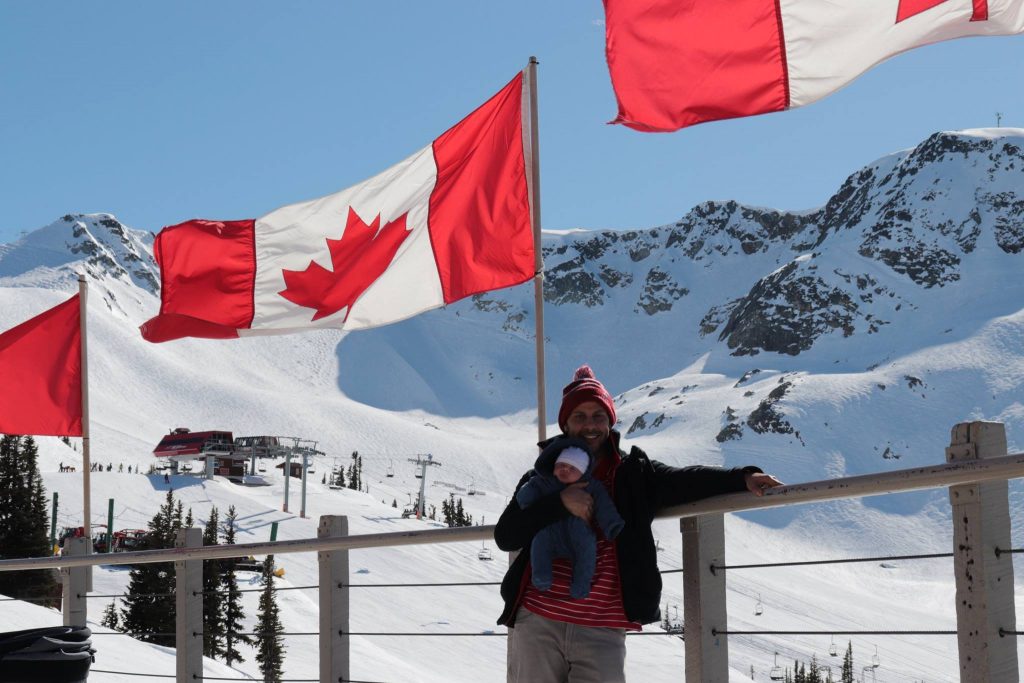
How did you feel about completing your surrogacy journey in Canada?
O: One thing that is amazing in Canada is the health services, which took care of us from point A to point Z. After he was born, we had nurses calling to make sure everything was ok, to come in for check-ups, and we didn’t have to pay for anything; we were taken care of so well and everything was so convenient. I would never do any kind of surrogacy anywhere else. We lived in America for over six years, and we found the people in Canada to be incredibly friendly, and not superficial. I think we got along so well with our surrogate because of the Canadian culture. Even when we went to restaurants, the experience was completely different than that in America. We felt an overall genuine desire from the Canadians we interacted with of caring and wanting to help.
S: The whole journey was a very positive experience for us, I cannot think of one negative thing to say, and if we were to do a sibling journey, we would definitely do it again in Canada.
O: The day before the delivery, Leia and Scott flew to Vancouver to visit us. They are both amazing people and we have such a wonderful relationship with both of them. Leia has such a big heart, and when she loves someone, she really loves them all the way through. I could see how much she cared about us, and how much she wanted everything to go smoothly for us in our journey through Canadian Fertility Consulting. Getting to know both Leia and Scott during our journey just made our whole experience ten times more pleasant than a normal surrogacy where you only have a case manager and you never get the chance to connect with the people behind the scenes who are running the business.
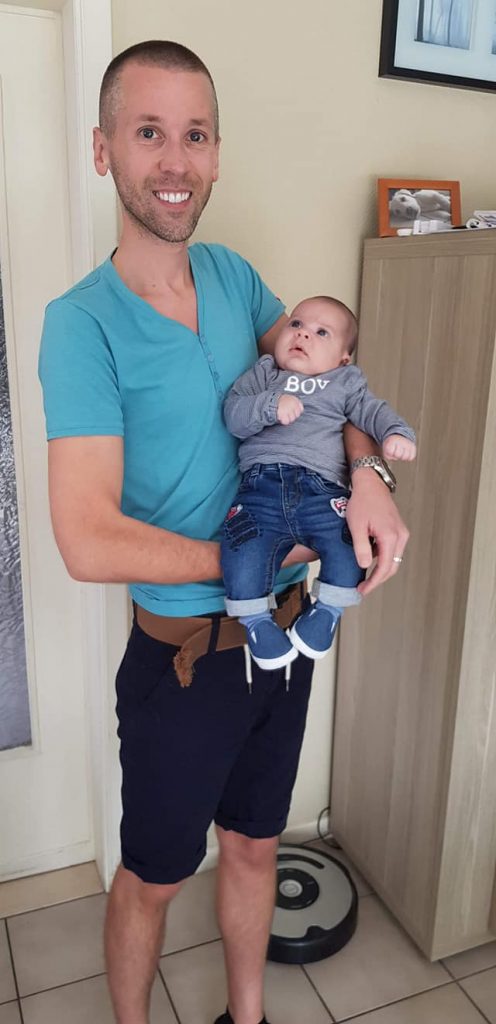
How did surrogacy change your life?
S: Life has changed completely, but in the best possible way.
O: We thought we had prepared ourselves before his birth, but afterwards it was completely different than anything we could have imagined. We prepared to go into it with buying supplies and equipment, but the effect that it has on your emotions is something you can never plan for. It’s just a completely new spectrum of love that you’ve never experienced before.
S: For us, it was also so much more than just having the baby, it was also about having that great relationship with our surrogate. It was a combination of firsts, of feeling blessed for having such a beautiful and healthy child, and then being super lucky that our surrogate had a good pregnancy and delivery without any health-related issues.
O: We were only two people going into this journey, and now we not only have a baby but an entire extended family through our surrogate.
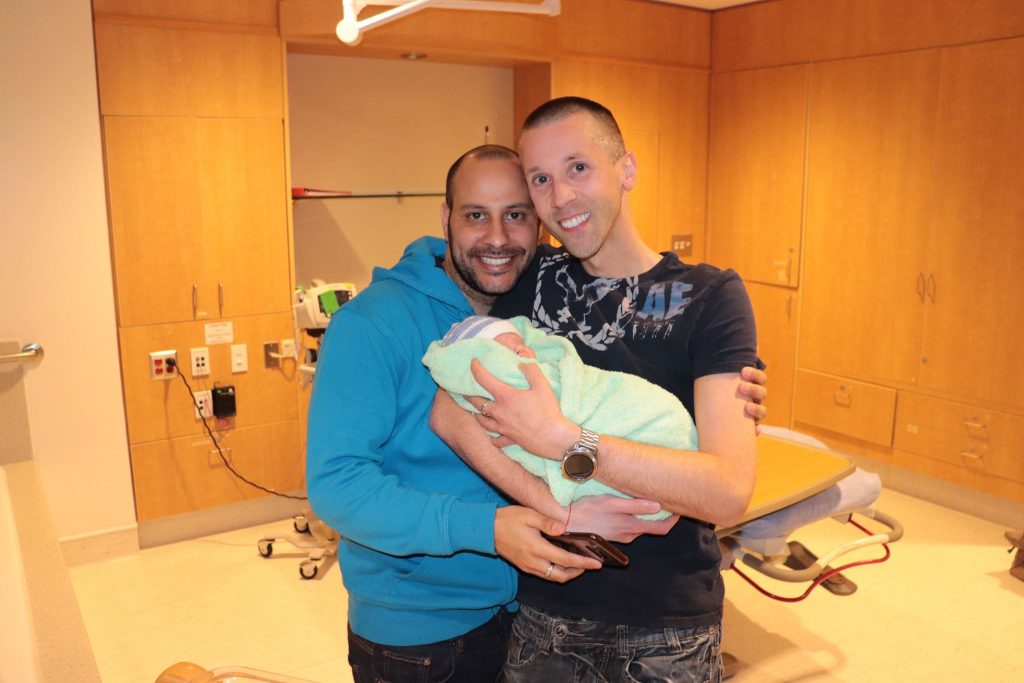
What was the best part of your surrogacy journey?
O: The delivery, of course! But also, when we learned that we were pregnant! Those first three months were super emotional, and once we passed that we were able to tell our families which was also super exciting.
S: For me, it’s so hard to choose just one moment, especially since these special moments just continue to happen. For example, we were just interviewed for a local newspaper that is releasing a special article for Father’s Day about our story. Our next-door neighbours, who are people that we only ever really say hello to, had read the article and sent us a wonderful card congratulating us on the birth of our son. They had no idea that we had gone through this whole surrogacy experience until they saw us in the newspaper. But if I had to pick just one, it was the moment where Jayden was handed over to me. In the photos, you can see the nurse handing him to me and I have this huge smile and tears in my eyes. I get goosebumps just thinking about it.
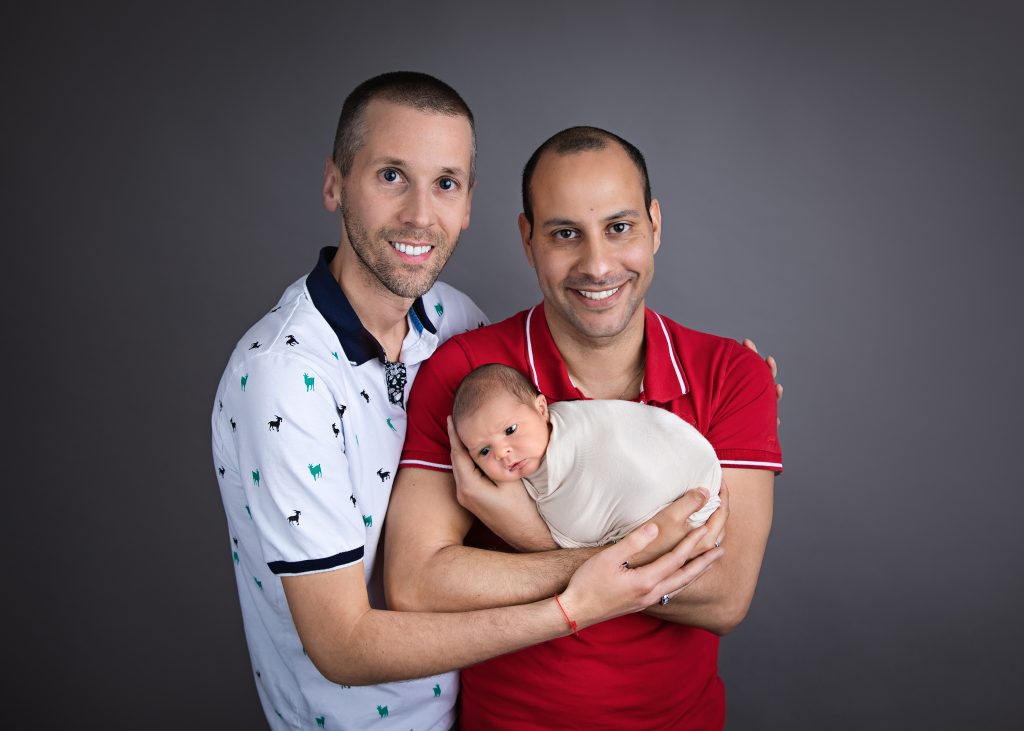
What would you say to other Intended Parents considering surrogacy?
O: Do it in Canada! Definitely!
S: Also, don’t give up on your dreams. It does take a while to get there, it’s not easy and there are a lot of bumps along the road. Odds are there will be issues that come up, but that is just a part of the journey.
O: I think the most important advice I can give is to be patient. People lose their patience and think that everything should happen in the snap of a finger and the reality is that it simply doesn’t happen like that. The truth is, you’re not in control and so you need to learn to let go. Once you learn to let things go, everything will go smoother. Personally, I’ve known since I was 16 or 17 years old that I wanted to be a father, so I’ve already waited almost 13 years to get to here, what is another two or three months at this point? All of the stress that you put on the surrogate and on the doctors, all of that will just make things so much harder. When you try to push and push, instead of moving things forward, you get the opposite effect.
S: It’s important to trust your surrogate, and make sure you have her back and you’re supporting her. Also, trust in your caseworker, as they really are trying their best. Throughout your journey, you have to place your trust in others. Not everything is within your control, so you have to learn to trust the process and surrender.
Thank you Steven and Oren for sharing your incredible surrogacy story with Canadian Fertility Consulting.

